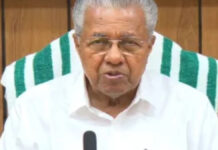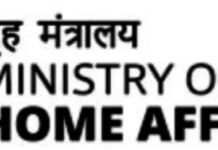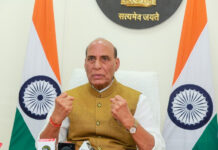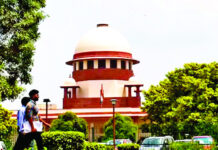Fugitive diamond merchant Nirav Modi was denied bail by a UK court on Wednesday for the third time in his extradition case to India to face charges in the Punjab National Bank fraud and money laundering case amounting to up to USD 2 billion and will continue to be lodged in a London jail described by his lawyers as “unliveable”. His bail, which had already been rejected twice before by Westminster Magistrates’ Court in London, came up for a third attempt before Chief Magistrate Emma Arbuthnot, who ruled that while the doubling of security offered by Nirav Modi’s lawyers did amount to a change in circumstances in order for her to hear the “renewed” bail plea, she still had similar concerns as before that he would fail to surrender before the court. “This is a large fraud and the doubling of security to 2 million pounds is not sufficient to cover a combination of concerns that he would fail to surrender (if bail is granted),” said Judge Arbuthnot. The next hearing in the case will now take place on May 30, the previously scheduled date for a case management hearing in Nirav Modi’s extradition case. Nirav Modi, who has been lodged at Wandsworth prison in south-west London since his arrest in March, was brought up to the dock and sat behind a glass-panelled enclosure with two female prison officers. The 48-year-old, who was freshly-shaved and dressed in a light-blue shirt and dark trousers, could be seen making copious notes in a notebook during the entire course of the hearing. “His experience in custody has been vivid and damaging… he is willing to abide by any bail conditions imposed by the court because Wandsworth is unliveable and makes the effective preparation of his case virtually impossible,” said his barrister Clare Montgomery, in an attempt to persuade the judge to grant bail on a strict 24-hour curfew at his posh Centrepoint apartment in the West End of London. “Suffice to say efforts to present him [by the government of India] as a diabolical mechanic and cold blooded, hardened criminal are completely false,” Montgomery added. However, the judge was particularly concerned about Nirav Modi’s “lack of community ties” in the UK, having been based in London for only a “short period of time” since 2017. And, while his lawyers sought to convince her otherwise with claims that two of his elder children were back in the UK for summer internships, the judge expressed doubts on the extent to which adult children can tie anyone down to a place. “Given the nature of the crime of sizeable fraud and that USD 60 million has been squirreled away by him personally…the interference of witnesses, destruction of servers and mobile phones…combined with a lack of community ties mean I still have doubts that he would fail to surrender,” the judge said. She made particular note of a transcript of a conversation provided by the Indian authorities between Nirav Modi’s brother, Nehal Modi, with one of the witnesses in the case, where it appeared that he was telling them what to say. It led her to dismiss the defence team’s claims that the witnesses were in fact being “leant on” or intimidated by the Indian authorities. Montgomery characterised the case as a “classic white collar” crime that came with relatively low risk but the UK’s Crown Prosecution Service (CPS), which represents the Indian government in the extradition proceedings, countered that in fact the case was “not an ordinary corporate case”, with direct evidence of embezzlement of funds with the connivance of bank officers in India. “There is very credible evidence of interference with witnesses…they (former employees) were being told what to say. And, there is nothing to prevent a concerted attempt by Modi to abscond,” said CPS barrister Nick Hearn. The court heard great details of how Nirav Modi’s US-based brother, Nehal, interacted with former employees of companies associated with Nirav Modi and arranged for their flights to Cairo, Egypt, and was also said to be behind the destruction of “evidence” in the form of servers and mobile phones. Hearn also made reference to USD 60 million held in one of Nirav Modi’s personal accounts, which indicated that there was a large scale of untraced “fraudulent funds”, which Nirav Modi would have greater influence over in a “less secure environment outside jail”. “There have been significant seizures in India of concrete assets, precious items [belonging to Modi],” Montgomery said, in an attempt to counter allegations that he would have substantial assets at his disposal were he to be released. She also raised the failure of the Enforcement Directorate (ED) and Central Bureau of Investigation (CBI) to corroborate a previous claim of Modi having travelled to New York in February 2019 and repeated her previous submission that her client sees the UK as a “safe haven” and has chosen not to flee to any other country with which India does not have an extradition treaty. Nirav Modi’s legal team, led by solicitor Anand Doobay, had previously offered 1 million pounds as security alongside an offer to meet stringent electronic tag restrictions on their client’s movements, “akin to house arrest” – something they further bolstered on Wednesday by doubling the sum and offering a 24-hour electronic tag curfew. He was arrested by Scotland Yard officers in central London on March 19. During subsequent hearings, the court was told that Nirav Modi was the “principal beneficiary” of the fraudulent issuance of letters of undertaking (LoUs) as part of a conspiracy to defraud PNB and then laundering the proceeds of crime.

Dogra Herald is the media of J & K, breaking language and geographical barriers, connecting J & K to the rest of India.
0191 245 4946
info@dograherald.com
Latest articles
Lok Sabha Elections 2019: EC imposes fresh ban for 48 hours on Azam Khan rallies
iamjkstarr - 0
The Election Commission imposed a fresh ban on Samajwadi Party leader Azam Khan from campaigning for 48 hours for his provocative speeches against the...
Addl. Commissioner State Taxes Jammu reviews performance, enforcement activities of Circle office, enforcement team Jammu North at Udhampur
Emphasizes on continued vigilance, taxpayer facilitation
DH NEWS SERVICEUDHAMPUR, Apr 18Additional Commissioner, State Taxes, Jammu, Namrita Dogra, today conducted...
Special Gram Sabhas held across district Ramban
RAMBAN, APRIL 10: District Administration Ramban today organized Special Gram Sabhas across all 143 panchayats of the district Ramban to finalize...


























